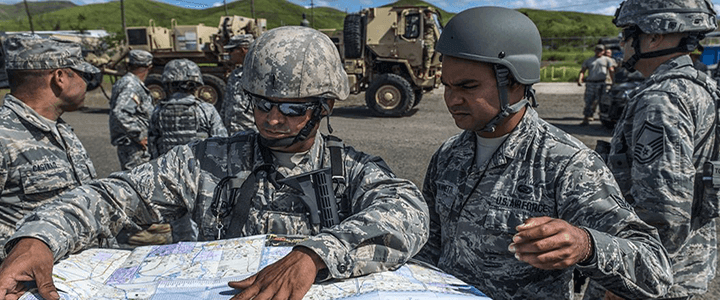This week, Daily Intel has been examining the military assets available to the civilian authorities coordinating the relief efforts in Puerto Rico. Maris a was the third major hurricane to hit the U.S. and its territories in the space of a month. Although Puerto Rico got its 15 minutes of fame from the giant attention-deficit disorder case study known as the U.S. media, the focus has shifted to Las Vegas.
But America’s soldiers, sailors, airmen, Marines, and coast guardsmen — active and reserve — can take pride in their efforts. The Defense Support to Civil Authorities mission continues even if the cameras aren’t rolling, and will continue for the foreseeable future. We’ve discussed the magnitude of the challenge, and the roadblocks, literal and figurative, that have hampered the response. That isn’t stopping the military though.
Puerto Rico Gov. Ricardo Rossello told the world yesterday that there are now more than 11,000 military personnel working on hurricane relief efforts in Puerto Rico. The White House elaborated, saying that in addition to those soldiers, the Department of Defense has deployed “80 tilt- and rotary-wing aircraft; provided 5.8 million liters of water; 7.3 million meals; 22,000 costs; 11,000 tarps; 278 generators; and more than 100 field trucks and drivers.”
The doctors and medics caring for the sick and injured, and the air crews ferrying supplies to hard-to-reach areas get the most attention, but there’s another group that deserves some recognition: the engineers.
essayons – “Let Us Try”
I gained a newfound respect for Army combat engineers when I was assigned to my first Army Reserve unit back in 1993: the 841st Engineer Battalion (Combat)(Corps)(Wheeled) in Miami, Fla. As an armor officer on active duty, my experience with combat engineers had been when they breached obstacles between us and the enemy, or dug my tank’s fighting position incorrectly.
Doctrinally, engineers provide mobility, countermobility, and survivability. This means they make roads, break roads, or build protective earthworks. These Reservists were different. They built roads and canals and culverts and bridges, and attacked their work like it as the most important thing in the world. They were good at their jobs, and they loved every second of it.
Guys like that are taking their skills to Puerto Rico, and you wait and see how quickly those roads get cleared.
The Puerto Rico Army National Guard’s primary unit is the 92nd Maneuver Enhancement Brigade, which was an Infantry Brigade Combat Team until recently. Unlike other MEB’s, the brigade still retains two infantry battalions in addition to its military police battalion, signal company, chemical company… and engineer battalion. Another engineer battalion is assigned to the island’s 101st Troop Command.
Those engineers had a head start, but the scope of the infrastructure damage is too great. Plus, they’re probably a little distracted, being residents of Puerto Rico, and thus victims themselves. So the Army Reserve and National Guard are sending reinforcements.
The 922nd Horizontal Engineer Company, part of the Louisiana National Guard, specializes in road construction. They’ll be clearing debris and rebuilding roads. 150 soldiers of the South Carolina National Guard’s 122nd and 178th Engineer Battalions are on the way. And more Guardsmen from N. Carolina’s 105th Engineer Battalion, which includes a Mobility Augmentation Company, whose job is to keep the road open no matter what, will deploy this weekend. The unit’s asphalt company will be cranking out the blacktop for all the road repairs necessary to open supply routes.
Opening those routes is the key to moving supplies away from the ports and coastal airports. Essayons.




